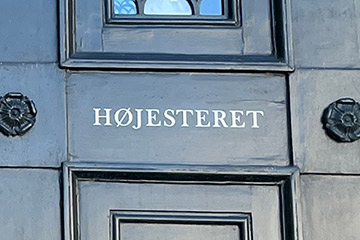Danish Supreme Court finds that fee for commercial waste disposal was levied unlawfully
According to today’s judgement, the administrative fee for commercial waste disposal levied by Danish municipalities from 2010 to 2018 on undertakings which did not produce waste was unlawful. The fee was levied on approximately 300,000 undertakings.
Today, the Danish Supreme Court ruled that the administrative fee for commercial waste disposal was levied unlawfully on an undertaking which did not use the municipal commercial waste disposal scheme.
The administrative fee in question was a compulsory fee for commercial waste disposal which Danish undertakings had to pay, regardless of whether they used the municipal waste disposal scheme. During the period 2010 to 2018, the municipalities levied fees of around DKK 100 million annually on approximately 300,000 undertakings.
In 2015, Thomas Gønge, who operates DGL, the Greenlandic Code, a small, internet-based information service, and who is also an attorney-at-law with Plesner, requested exemption from the fee and later instituted legal proceedings against the City of Copenhagen. An annual fee of DKK 937.50 was levied on the undertaking, which consists of himself, a computer and a telephone. Although it did not throw out as much as a single sheet of paper for the municipal commercial waste disposal scheme. The municipality refused to exempt the undertaking from paying the fee as, like many other municipalities, it considered it to be optional whether to exempt undertakings from the fee.
With the votes 5-4, the Danish Supreme Court upheld the Danish Eastern High Court’s judgment delivered in August 2019. However, the Supreme Court changed the reasoning from it being unlawful to levy the fee on undertakings which do not use the municipal commercial waste disposal schemes to it being unlawful to refuse to exempt undertakings which do not actually produce waste.
"I am very pleased that we are finally able to bring the case to an end based on the Supreme Court's judgment. Ordering someone to pay a fee for a waste disposal scheme which they do not use is fundamentally wrong, and today’s judgment establishes that it is not lawful either. A fee constitutes payment for a service, and if you do not receive a service, you do not have to pay the fee and thus subsidise undertakings which actually receive services. That is why we believed that the administrative fee for commercial waste disposal was levied without the requisite authority. This has now been established conclusively by the Supreme Court," says Thomas Gønge.
"The City of Copenhagen had support from Local Government Denmark (Kommunernes Landsforening) and the Danish Energy Agency (Energistyrelsen) in the matter. They are very clever and persistent adversaries, and the public authorities have used considerable resources to conduct the case, which is completely understandable when taking into consideration that this is a matter of principle. At the same time, it has also meant that it has been demanding to conduct the case for five years. It was such an important and fundamental issue affecting many small undertakings in Denmark, and therefore the case had to be argued all the way," says Thomas Gønge.
Svend Erik Holm, Attorney-at-Law and Partner with Plesner, assisted in conducting the case.
"The case has been interesting for several reasons. The dispute concerning a fee which does not relate to a service raises both fundamental, administrative law, tax law and constitutional questions which it has been important to clarify. If you have a business and you believe, based on the judgment, that the waste disposal fee was levied unlawfully on you, you should contact the municipality/ties levying the fee," says Svend Erik Holm.
The administrative fee for commercial waste disposal was abolished from 1 January 2019 and replaced by tax-funding. DKK 50 million annually has been set aside in the Budget.
See a time line of the case (in Danish)
Read the Danish Supreme Court's judgment (in Danish)
Read the Danish Eastern High Court’s judgment (in Danish)
Read the Copenhagen City Curt's judgment (in Danish)







